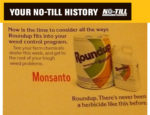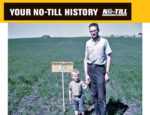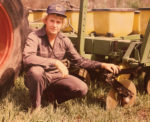Advertise Follow Us
Articles Tagged with ''Monsanto''
No-till’s greatest growth came with the discovery of glyphosate as a weedkiller, and growers started to ‘park the plow.’
Read More
Memories from Western Canada – The Schmeiser Family Farm
Son of the late Percy Schmeiser – who famously battled Monsanto – recounts no-till’s memories in Saskatchewan.
Read More
Timeline of Herbicide Developments
As weed-control products came of age in the decades after World War II, no-tillage was given a chance to become a viable practice.
Read More
Reminiscing on No-Till’s Revolution
Four no-till pioneers share how they’ve seen the practice change over the last few decades and what factors will play a role in its future.
Read More





.png?height=125&t=1731942302&width=150)




